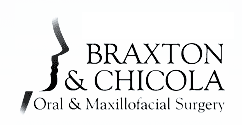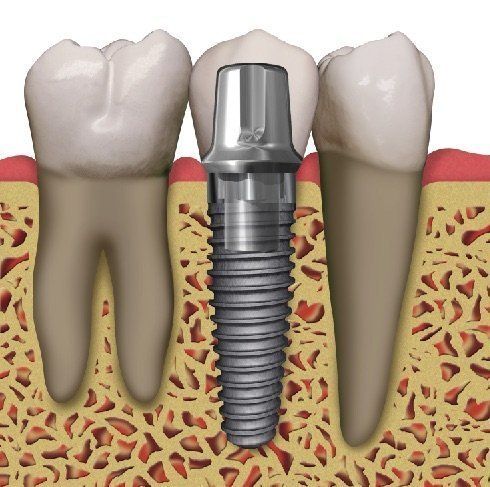Dental Implant
DENTAL IMPLANT SERVICES FOR PENSACOLA, FL
Braxton & Chicola provides dental implant services to patients in the Pensacola, FL area. If you're interested in learning more about dental implants, or scheduling a surgery, please call us toll free at 800-450-7886.
Over the past several decades, dental care has come a long way. Unfortunately, it is still not uncommon for people to lose teeth, whether due to due to injuries, gum disease, or general tooth decay. Traditional solutions such as bridges and dentures often cause discomfort for many patients. Until recently, these were the best options available, but now dental implants have a proven success record.
WHAT ARE DENTAL IMPLANTS?
Dental implants themselves are tiny titanium posts that are surgically placed into the jawbone where teeth are missing. Rather than rest on the gumline like traditional dentures, these metal anchors act as tooth root substitutes. The jaw bone bonds with the titanium implant through a process known as osseointegration, creating a strong support system for the replacement tooth. Small posts that protrude through the gums are then attached to the implant, and a crown is either cemented or screwed onto this post to recreate the appearance and function of a real tooth. These will match your natural teeth and you have the option to make them either permanent or removable. Dental implants may also help preserve facial structure by preventing the bone deterioration that occurs when teeth are missing.
ARE YOU A CANDIDATE FOR DENTAL IMPLANTS?
If you are considering dental implants, your mouth must be examined thoroughly and your medical and dental history reviewed. If your mouth is not ideally suited for dental implants initially, regenerative surgery such as bone grafting may be recommended.
THE SURGICAL PROCEDURE
For many patients, the placement of dental implants will involve two surgical procedures. First, implants are placed within your jawbone. For the first three to six months following surgery, the implants are beneath the surface of the gums gradually bonding with the jawbone. You should be able to wear temporary dentures and/or a temporary prosthesis to avoid the appearance of a missing tooth.
After the implant has bonded to the jawbone, the second phase begins. The implant(s) are surgically uncovered by removing a thin layer of gum tissue that was sutured over them during surgery, and small posts that protrude through the gums are placed to condition the tissues and allow them to accommodate to once again having a tooth present. Your restorative dentist can then replace this with a post that is designed to have a crown either cemented or screwed onto it. Once the crown(s) are placed, these posts will not be seen. The entire procedure usually takes six to ten months. This may vary depending on individuals' age, pre-surgical condition, and healing capacity. Most patients experience minimal disruption in their daily life.
SURGICAL ADVANCES
Using the most recent advances in dental implant technology, Drs. Braxton, and Chicola are also able to place single stage implants. These implants do not require a second procedure to uncover them, but generally do require a healing time before they can be fitted with final crowns or prosthetic tooth replacements. There are even situations where the implants can be placed at the same time as a tooth extraction – further minimizing the number of surgical procedures and the total treatment time.
Dental implant placement is a team effort between an oral and maxillofacial surgeon and a restorative dentist. While the Oral Surgeon performs the actual implant surgery, initial tooth extractions, and bone grafting if necessary, the restorative dentist (your dentist) fits and makes the permanent prosthesis (crown, denture, etc.). Your dentist will also make any temporary prosthesis needed during the implant process.
WHAT TYPES OF PROSTHESIS ARE AVAILABLE?
Dental implants can be restored with individual crowns, bridges, or even dentures. Implants can support "fixed" restorations that either cement or are screwed onto the implants, or they can be used as attachment points for "removable" restorations such as dentures or partial dentures. The number of implants needed may vary somewhat and is dependent on factors such the type of planned restoration and the quality and quantity of bone available at the sites where implants are planned. This can be discussed in detail at the consultation visit so the patient can gain an understanding of the possibilities for their case, the advantages and disadvantages of each available option, and can then make the best and most informed decisions regarding their implant surgery.
Drs. Braxton, and Chicola perform in-office implant surgery in a state-of-the-art operating suite, utilizing the latest advances in implant technology and patient monitoring. Inpatient hospital implant surgery is for patients who have special medical or anesthetic needs, or for those who require extensive bone grafting.
WHY SELECT DENTAL IMPLANTS OVER MORE TRADITIONAL TYPES OF RESTORATIONS?
There are several reasons that dental implants may be the right choice for you:
- Patients and/or dentists may not like the idea of sacrificing the structure of adjacent teeth on either side of a missing tooth to replace the missing tooth with a conventional bridge.
- Patients who do not like the idea of a removable appliance may gain the ability to have a "fixed" or non-removable appliance placed.
- Patients who wear removable appliances such as a complete or partial dentures can have implants placed to serve as anchor points, allowing the denture to fit more securely, snapping into place correctly each time, and only coming out when the patient decides to remove it for cleaning and/or at night. This can also permanently eliminate the need for denture pastes and adhesives.
WHAT TYPE OF ANESTHESIA IS USED?
The majority of dental implants and bone graft can be performed in the office under local anesthesia, IV sedation, or general anesthesia.
DO DENTAL IMPLANTS NEED SPECIAL CARE?
Once the dental implants are in place, they will serve you well for many years if you take care of them and keep your mouth healthy. This means taking the time for good oral hygiene (brushing and flossing) and keeping regular appointments with your dental specialists.
Contact
the office of Braxton & Chicola in Pensacola, FL today to schedule a consultation to discuss whether you are an ideal candidate for dental implants!




